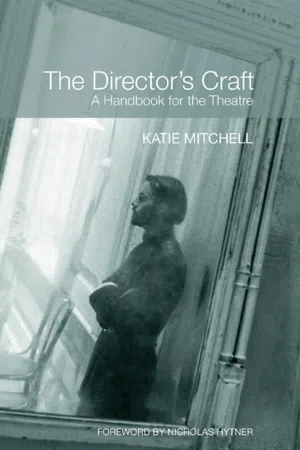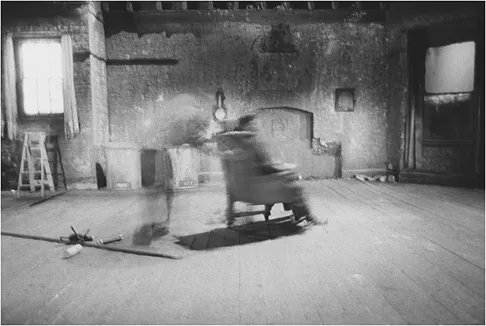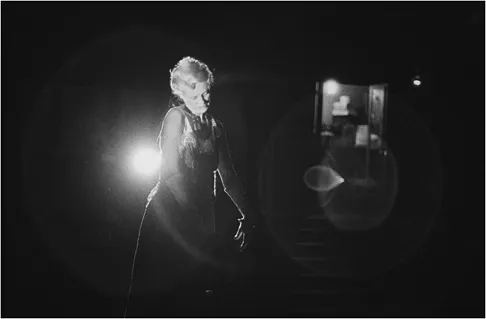![]()
PART ONE
PREPARING FOR REHEARSALS
Preparing for rehearsals
This section of the book describes everything you need to do to prepare for rehearsals. The goal of your preparation should be extracting information from the text that will help the actors to perform the characters and situations in the play.
When you look at a situation in life, you will notice that the behaviour of the individuals involved is determined by a complex set of factors. Think back to the last time you observed a couple in a room having an argument. Did you notice whether the room they were standing in was hot or cold, airy or stuffy? Did you notice whether it was a room in a house or a flat? Did you notice whether there were people near who could overhear or not? Did you notice the time of day? Did you have any future pictures about what the people were going to do next? Did you have any past pictures of events in the relationship that were determining the present action? Were you able to notice any of these things, even if the words the two people were saying to each other did not touch on any of these subjects directly? Did you notice what each of them wanted from the other person? Did they want to be forgiven or to be understood?
A lot of this information will be legible in what the couple do physically – you will be able to read information by how they sit, how they move, how they spread the butter on their toast or put their coat on as they are leaving. For example, if it is cold the two people will make involuntary and voluntary gestures to keep warm. If one person is late, their actions will be faster than those of the other person. Other information will emerge from how they talk to each other, whether quickly or slowly, quietly or loudly. The information this couple communicate about themselves and their relationship is therefore both verbal and physical. And if it is verbal, the tone of how they speak is as significant as the content of what they are saying.
When you read a play, it is a good idea to search for information about all the factors that create or affect the behaviour of the characters in the action of the play (or the factors that determine the changes in their behaviour). If these factors are not explicitly stated, you might need to read the scenes carefully to infer the precise circumstances in which the characters find themselves. The factors you need to search for come under the following headings:
There are, of course, other preparations that you need to make before directing the play and these preparations will be investigated in the chapters that follow. But identifying the factors that determine the behaviour and the actions of the characters should lie at the heart of your preparatory work.
![]()
CHAPTER 1
Organising your early responses to the text
This chapter is about organising your early responses to the text and building the world that exists before the action of the play begins. It has six steps:
Undertaking these steps will ensure that you have an objective relationship to the play. Your objectivity will help you to build a world that is specific and, later on, it will help you talk about the play in a way that actors will find useful.
Using lists of facts and questions
When you first start working on a play, you need a simple way of organising your discoveries and responses. Listing information in the form of facts and questions will help you to do this. Facts are the non-negotiable elements of the text. They are the main clues that the writer gives you about the play. In The Seagull they include things like ‘Arkadina has a son called Konstantin’ or ‘Medvedenko is a school teacher’ or ‘It is Russia’. Questions are a way of notating the areas of the text that are less clear or that you are simply not sure of. Ask a question about anything that is not simple or clear. Questions might include things such as ‘What happened to Konstantin’s father?’, or ‘What season is it?’, or ‘Where is Sorin’s estate in Russia?’ Always write facts and questions down in simple and objective sentences. As a rule of thumb, if you are not immediately sure that what you have identified is a fact, turn it into a question.
Organising information in this way encourages you to hold an objective relationship to the material and inhibits premature attempts to interpret the play. Lists of facts and questions will be used in the exercises outlined in this chapter and in Chapter 2, when working on the action of the play.
Organising information about what exists before the action of the play begins
Organising information from the text about what exists before the action of the play begins will help you to map the physical, geographical and temporal certainties of the play – and create a picture of each character’s past. No rehearsal process occurs without the actors asking questions about what has happened before the action of the play begins, and it is therefore enormously advantageous to have a firm grasp of this information. This will enable you to address simple questions about place like, ‘Where have I just come from?’, or more complex questions about past events in characters’ lives like, ‘When did I first meet Trigorin?’
Use the facts and questions format to collect information about everything that exists or has happened before the action of the play. Make two lists: one of facts and one of questions. I call these lists the ‘back history’ lists. Facts include things like ‘Arkadina married Gavril Treplev’ or ‘It is Russia’ or ‘Nina’s mother is dead’. Every fact must be written down – however tiny. It might just be a brief and apparently irrelevant event like Sorin’s description of how one of his deputy prosecutors told him his voice was disagreeable, or the fact that Trigorin’s writing is translated into other languages, but each one matters when it comes to building a past life for the character. Questions include things like ‘What happened to Konstantin’s father?’, or ‘Where is Sorin’s estate in Russia?’, or ‘When and where did Arkadina play La Dame aux Camélias?’
Remember, if you are uncertain about whether something is a fact or a question, put it down as a question. For example, you may want to put ‘Arkadina played Gertrude in Hamlet’ as a fact because she quotes from the Shakespeare play in Act One, but there is no direct evidence that she played Gertrude so it is best to write the question ‘Did Arkadina ever act Gertrude in Hamlet?’ Sometimes you will find that questions you ask at the beginning of the task are answered later on in the action. When this happens, cross out the question and add the answer to the list of facts. Remember, however, not to list any information about events in between scenes or anything that happens during the action of the play.
Here are the first few facts established by reading Act One of The Seagull.


